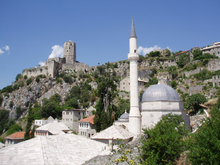Vladislav Hercegović
[3] The reason behind infighting can be found in a writing by the Italian chronicler Gaspare Broglio Tartaglia da Lavello, who says that Herzeg's envoys brought from Florence a young Sienese girl, intending to present her to his son, Vladislav.[6] King came with his vassal Petar Vojsalić and a military contingent in mid-April, when allied forces including Vladislav, Vlatkovićs and all the other petty Hum's nobility came together against Herceg and his younger son Vlatko.[7] The alliance was very successful, especially because Hum's general population was extremely dissatisfied with Stjepan's rule, the king and despot were in agreement and the Porte, on huge Herceg disadvantage, was neutral;[8] only Venice remained friend with him during the war,[9] and he had his local vassals.[17] With some doubt over the exact date and place, Herceg Stjepan eventually forgave his eldest son, his wife, and Hum's nobility for rebelling against him, and everything was sealed with a treaty in a ceremony held in Pišče [sh] on the Piva, on the road to the Sokol Fortress, between 1 and 5 June, with the confirmation and vouching by the djed of the Bosnian Church and its 12 clerics, called strojniks, and led by gost Radin, who served as witnesses.[18][19] It was also stipulated that the Herceg must not take any action against dukes Ivaniš Vlatković and Sladoje Semković, and knezs Đurađ Ratković and Vukašin Sanković, nor any of the nobles who were not part of the family's immediate circle, until the suspicions were first checked by the djed of the Bosnian church, twelve strojniks, among which a place was reserved for Radin Gost.[25] Around the same time, late 1473 to early 1474, his younger brother Stjepan departed for Istanbul,[26] where he converted to Islam as Ahmed Pasha Hercegović, after which he would hold various top positions in his 40-year career, including the highest function in the Ottoman navy.In November 1481, Ajaz-Bey of the Sanjak of Herzegovina besieged Novi but just before 14 December 1481, Vlatko ceased resisting and agreed with the Ottomans to move with his family to Istanbul.Vladislav's siblings were older sister Katarina, who was the oldest, and younger brothers Vlatko and Stjepan, who was the youngest and who converted to Islam in 1470, took the name Hersekzade Ahmed Pasha and was five-time grand vizier of the Ottoman Empire.A surviving letter from King Alfonso of Naples and Aragon to Vladislav's father Stjepan dated 5 April 1455 congratulates the latter that two of his sons are married: one to the niece of the Despot of Serbia (who would be Anna Kantakouzene), and the other to the sister of the Count of Cilli.
Grand Duke of BosniaNoble familyKosača noble familyStjepan Vukčić KosačaJelena BalšićSerbian CyrillicStjepan VukčićHumska zemljaHerzegovinaBosnian KingStjepan TomašRepublic of RagusaDubrovnikVlatkoKonavleFlorenceSieneseTođevacSutjeskaNevesinjeImotskiLjubuškiRadisavSokol Fortressgost RadinOttoman EmpireRepublic of VeniceHungarianCroatianMatthias CorvinusKriževciPočiteljNeretvaTvrtko IMahmud Pashacourt chaplainstestamentIstanbulAhmed Pasha HercegovićSultan Mehmed IIBayezid IIAjaz-BeyBosnia EyaletHersekzade Ahmed Pashagrand vizierGeorge Palaiologos KantakouzenosDespot of SerbiaCount of CilliBalšaVuk KosačaVukac Hranić KosačaĐurađ IIBalša IIIJelena LazarevićBašagić, Safvet-begĆirković, SimaĆorović, VladimirŠanjek, FranjoVego, MarkoVrankić, Petar
